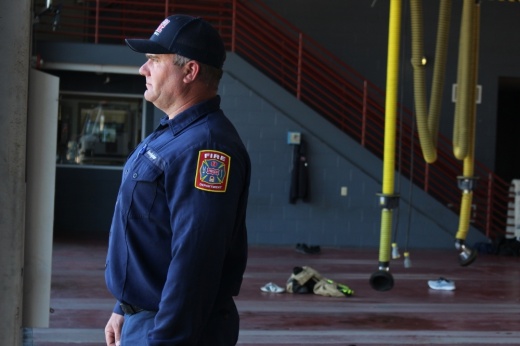Propositions A and B would introduce civil service and collective bargaining, respectively, to the Frisco Fire Department. The two structures are outlined in state law and used in more than 80 cities across Texas.
As election day nears, two groups have come out on either side: Safety First Frisco, whose members argue the structures would slow Frisco’s progress, and the Frisco Fire Fighters Association, whose members fought for the propositions’ placement on the ballot and say a change is necessary as the city grows.
The big picture
Civil service is a system with a three-citizen commission and tests to assess the hiring, firing and promotion of firefighters. Collective bargaining allows fire representatives to negotiate for annual contracts and department rules with the city.
To understand civil service better, Frisco residents can look to Plano, which adopted it in the 1970s.
“[Civil service] never impacted my ability to hire, terminate, promote, demote, whatever I needed to do,” said Sam Greif, Plano’s current deputy city manager and former fire chief.
Under civil service, firefighter terminations would go through the three-citizen commission for review before any action is taken.
Before Plano, Greif started his career in Fort Worth, which adopted civil service in the 1950s and collective bargaining in 2007. The two systems are nothing to be afraid of, Greif said.
Collective bargaining requires department and city officials to agree to terms including sick leave, benefits and pay, Greif said. If neither side can agree, a judge steps in for the final decision, he said.
Safety First Frisco member Bill Woodard, also a Frisco City Council member, said the structures could hurt the city’s progress by removing Frisco officials’ ability to manage the department.
Woodard said he participates in the political action committee as a citizen and any city statements would come from its communications department.
City officials declined interview requests.
The items already have some residential approval, Frisco Fire Fighters Association President Matt Sapp said. Over 5,000 signatures were collected across two petitions last summer to put the items on the ballot, according to city documents.
Woodard and the rest of council signed an open letter in August encouraging residents not to sign the association’s petitions.
What they're saying
“[Frisco has] phenomenal employees that work so hard for the residents of Frisco, and we’ve built a great city because of that over the last 30 years ... We haven’t needed collective bargaining or civil service to build that great city,” Safety First Frisco member Bill Woodard said.
“[Civil service] takes some of the arbitrariness out that happens in a city where they miss steps. You’ve got state law on your side—just follow the law, follow the procedures,” Plano deputy city manager Sam Greif said.
“It’s one of the best, cost-effective ways to create a fair, transparent workplace ... . It’s part of Texas state law – supported by Republicans, Democrats and Independents," John Riddle, Texas State Association of Firefighters president.
Zooming out
Dozens of fire departments across Texas rely on some form of civil service, said John Riddle, president of the Texas State Association of Fire Fighters, a non-partisan firefighters organization.
The hiring, promotion and discipline standards in civil service benefit the city and employees by reducing political interference and setting strong department standards, Riddle said in an email.
For example, civil service promotions and hirings are based on test scores instead of any bias or potential favoritism, Greif said.
“You just need to make sure you know the rules,” Greif said.
Implementing civil service would strengthen the department and the city the same way it does for other Texas fire departments, Sapp said.
Diving deeper
The standardized hiring process with civil service would make it easier to hire firefighters, Sapp said.
“We’re concerned about our call volume and our run times, which are increasing,” he said.
Frisco’s projected growth means additional fire stations should take priority over the new structures proposed by the propositions, Woodard said.
Through collective bargaining, allocating more money for staffing may hinder opening additional fire stations since it would take a larger percentage of the city’s budget, Woodard said.
“[Safety First Frisco] doesn’t believe that’s what the citizens of Frisco want,” he said.
What's next
The propositions are separate entities and could be approved together, denied together, or one approved and one denied.
Both pass: Officials have 90 days to implement civil service, form a three-citizen commission and begin work on a bargaining contract.
Only prop A passes: A citizen commission and civil service guidelines will be implemented in 90 days.
Only prop B passes: A citizen commission and civil service guidelines will be implemented in 90 days.
None pass: Nothing changes and the fire department remains as it is.





